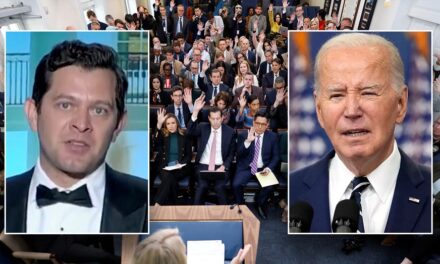In a city like Minneapolis, where community and business often interweave, the ongoing tensions related to law enforcement have taken a significant toll on local entrepreneurs. One prominent business owner is shedding light on how the recent rise in violence, which many attribute to the city’s handling of police matters, has affected his livelihood. He stands in a unique position, empathizing with both the police and the community, as he discusses the complex dynamics at play.
John Anderson, who owns a popular downtown coffee shop, has found himself at the intersection of conflicting sentiments about law enforcement and community safety. “I feel bad for the police,” Anderson states candidly. “They are just trying to do their job in an incredibly challenging environment.” He gestures toward the windows of his shop, where the stenciled logos represent a community that has always rallied behind local businesses. However, he confesses that the recent violence has shaken that very foundation.
The root of the city’s unrest can be traced back to significant events involving police brutality, which have led to widespread protests and calls for systemic change. While peaceful demonstrations have been a hallmark of this movement, the undercurrents of frustration have sometimes bubbled over into violence. For Anderson, the implications of this violence are stark and direct. “When riots break out or protests turn destructive, the impact spills over to us, the small businesses that are trying to survive amidst all the turmoil,” he explains.
Business owners across the city have echoed Anderson’s sentiments. Many have faced property damage, theft, and a declining customer base due to fears surrounding safety. In Anderson’s case, his coffee shop has experienced several instances of vandalism, with shattered windows and graffiti becoming a painful reminder of the unrest. “It’s disheartening to see something you’ve poured your heart into being threatened in such a blatant manner,” he laments.
However, Anderson’s perspective is not solely focused on his loss. He recognizes that police officers bear a burden of their own amidst the chaos. “They have families to go home to, and I can’t imagine the stress they deal with daily,” he says, illustrating a duality often overlooked in discussions surrounding policing. His ability to sympathize with law enforcement reflects a broader challenge facing the community: reconciling the need for justice and accountability with understanding the pressures on police officers working within a flawed system.
Anderson points out that many of his customers are law enforcement officials. He shares moments where they would come into his shop for coffee, discussing their days and the challenges they face. The understanding within these interactions highlights the complexity of the situation, revealing that not all interactions with law enforcement are negative. “I think there’s a lot of misunderstanding on both sides,” he remarks. “We need to focus on bridging that gap.”
The broader context of the situation also sheds light on the community’s frustrations with local government. Many residents feel that the city has failed to manage the violence effectively, leading to a rise in lawlessness that disproportionately affects small businesses. Anderson asserts, “There needs to be more thoughtful discussions about policing and community safety. Blaming the police alone isn’t the solution. It’s a systemic issue.” His words resonate widely, acknowledging that those in power have a significant role to play in restoring order and support to local businesses.
As Minneapolis grapples with these complex issues, Anderson remains hopeful. “We are a resilient community,” he states, determination reflecting in his voice. “We can rebuild, but we need to have conversations that matter. It’s essential for us to come together as a city.” Community resilience has been tested in the wake of violence, but it is within the fabric of shared experiences that hope and recovery lie.
In the face of adversity, Anderson leverages his position as a local business leader to promote community-building initiatives. He frequently organizes gatherings at his café—where neighbors come together to discuss solutions to community challenges, including community safety, business sustainability, and mutual understanding. This collaborative approach reflects an important ethos: preventing further violence and supporting local businesses requires cooperation and a dialogue that dissects the heart of the issue.
Anderson’s coffee shop serves as a microcosm for what could be achieved when a community prioritizes dialogue over division. Realizing that empathy and acknowledgment of shared experiences can pave the way towards healing, he encourages other business owners to engage in similar discussions while advocating for local government transparency. “If we want to see change, we need to hold our leaders accountable. They need to know how their decisions impact the very fabric of our city,” he explains.
Moreover, the conversation also extends into policy reform for police forces and community services. Anderson believes that investing resources into mental health services, substance abuse treatment, and social programs will greatly alleviate some pressures that spill over into street violence. “This isn’t just about policing; it’s about creating a holistic approach to community wellbeing,” he argues, highlighting a forward-thinking solution to the ongoing strife.
Despite the challenges he faces, Anderson remains committed to serving coffee with a side of change. His business not only provides sustenance but has become a space where dialogue flourishes, inspiring hope for a more harmonious future. “At the end of the day, we’re all part of the same community. The goal is to ensure everyone can thrive without fear,” he concludes.
The reality for many Minneapolis business owners, like Anderson, is that they cannot afford to turn a blind eye to the complexities surrounding policing and community safety. While they strive to maintain their livelihoods and serve their communities, finding common ground is essential in the road ahead. The voices of business owners are critical in the ongoing conversations about reform, safety, and community cohesion. Only then can Minneapolis begin to heal from the turmoil, moving toward a future built on understanding, resilience, and collaborative efforts.
































